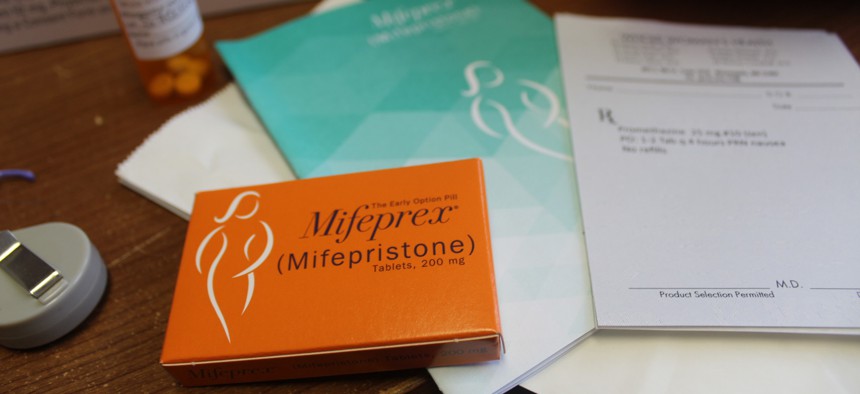Connecting state and local government leaders
A randomized study testing the safety of ‘abortion reversal’ had to be halted when doctors decided it became too dangerous for the participants.
Eight states have laws requiring physicians to inform women seeking medical abortions that the process can be reversed should they change their minds between the two steps of the procedure. But the laws have been condemned by people in the medical community, who say there is no evidence that so-called “abortion reversals” are safe and effective.
A new study sought to be the first to examine the practice. Published in Obstetrics and Gynecology, the study was a double-blind, placebo-controlled, randomized trial to test whether abortion reversal is safe and effective—but it had to be halted when three of the first 12 participants displayed hemorrhaging so severe that doctors ended the study out of concern for future participants’ safety.
“To observe the effects of new medical treatments, the first studies are primarily interested in safety. The next phase looks at efficacy, but if we discover in the first phase that it isn’t safe, we’re not going to put people at further risk,” said Dr. Mitchell Creinin, the lead author of the study and a professor at the University of California-Davis. “Three women were bleeding so far beyond what we expected, to the point where one called an ambulance and another was taken to the emergency room for a transfusion.”
The women who participated in the study had previously decided to have surgical abortions before agreeing to be part of the trial.
Medical abortions make up around 40% of all abortions administered in the U.S., and have been proven both safe and effective for decades. The process involves two pills, mifepristone and misoprostol, taken up to 48 hours apart. In an “abortion reversal,” a large dose of progesterone is taken after the first pill, supposedly reversing the effects and allowing the woman to keep the pregnancy to term.
There are roughly 52,000 abortions performed per month, according to CDC data. Abortion Pill Rescue, which describes itself as a network of 800 medical professionals who run a 24/7 hotline for those who wish to reverse their abortions, claim on their website to answer around 150 calls per month. A representative from the group did not return a request for comment about the study.
The American Association of Pro-Life Obstetricians and Gynecologists is a supporter both of the network and laws requiring physicians to inform their patients of its existence. “Some women change their mind about abortion after taking the first drug of the abortion regimen,” reads a statement from the group. “For those women, Abortion Pill Rescue offers a medically sound choice to attempt to reverse the effects of Mifepristone, and to save their baby.”
The American Congress of Obstetricians and Gynecologists, however, has said that such “legislative mandates based on unproven, unethical research are dangerous to women’s health.”
Lawmakers in eight states—Ohio, Nebraska, Oklahoma, Arkansas, Idaho, Kentucky, North Dakota, and South Dakota—have passed laws in recent years requiring abortion providers to inform patients that their abortions can be reversed.
The sponsor of the law in Ohio, state Sen. Peggy Lehner, a Republican who was once the president of Ohio Right to Life, said that the requirement is intended to give women options. "Women who decide to take their babies to term should be celebrated and supported," Lehner said in a statement celebrating the bill’s passage in November 2019. "This bill simply gives women more information about the option for a second chance to make an extremely emotional and difficult decision."
The laws have been put on hold by courts in Oklahoma and North Dakota.
State lawmakers who contend that the treatment is proven—and is between 64% to 68% effective—rely on three case series in which doctors monitored women who underwent the treatment to see if it allowed them to carry their pregnancies to term. But Creinin said the difference between a case study (or a collection of case studies known as a case series) and a scientifically validated study is enormous.
“Case reports are the lowest level of evidence,” he said. “They’re basically saying: a patient had this, the doctors did this, and here’s what happened. Case series don’t give you the full picture, and that can be misleading.”
In a study like Creinin’s, which underwent International Review Board approval and was monitored by FDA, researchers have to report any negative results, a step not practiced when case studies are compiled. In the case series that lawmakers have referenced during debates about abortion reversal, Creinin said that it’s not known what happened to participants whose treatment failed.
“A study shows you what happens to everyone involved,” Creinin explained. “If I published something about a new drug for hair loss, for example, and I said that it worked for half the participants, but I didn’t reveal that the other half of the participants had all their teeth fall out, that wouldn’t be reputable. That’s what’s happening here. We just can’t say that abortion reversal is safe or effective because we don’t have the studies.”
Creinin said that the results of his study didn’t disprove the possibility that abortion reversal could be possible. “It may be that in some groups, perhaps in a certain gestational age range, this treatment is safe,” he said. “But all we know right now is that it carries substantial risk. For legislators to promote it as a widespread panacea for the very rare woman who changes her mind creates serious ethical issues. It’s encouraging women to join an uncontrolled experiment without appropriate oversight.”
Emma Coleman is the assistant editor for Route Fifty.
NEXT STORY: A State Restarts Its Electric Vehicle Rebates




